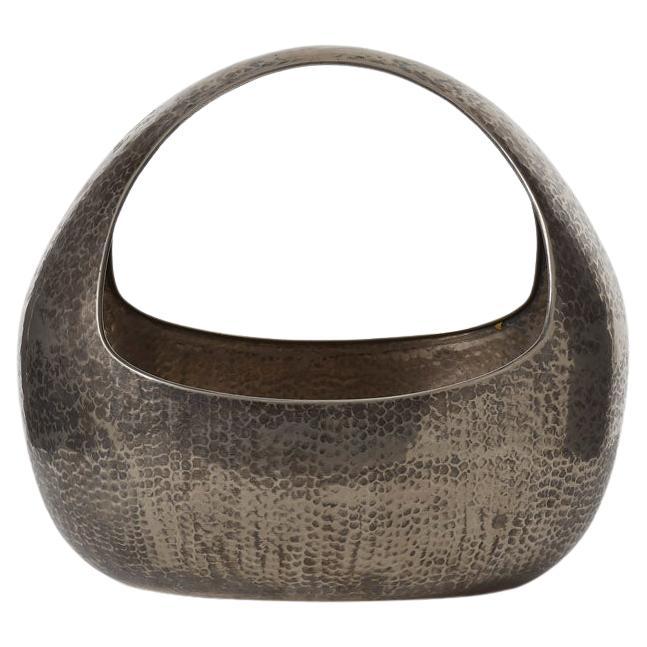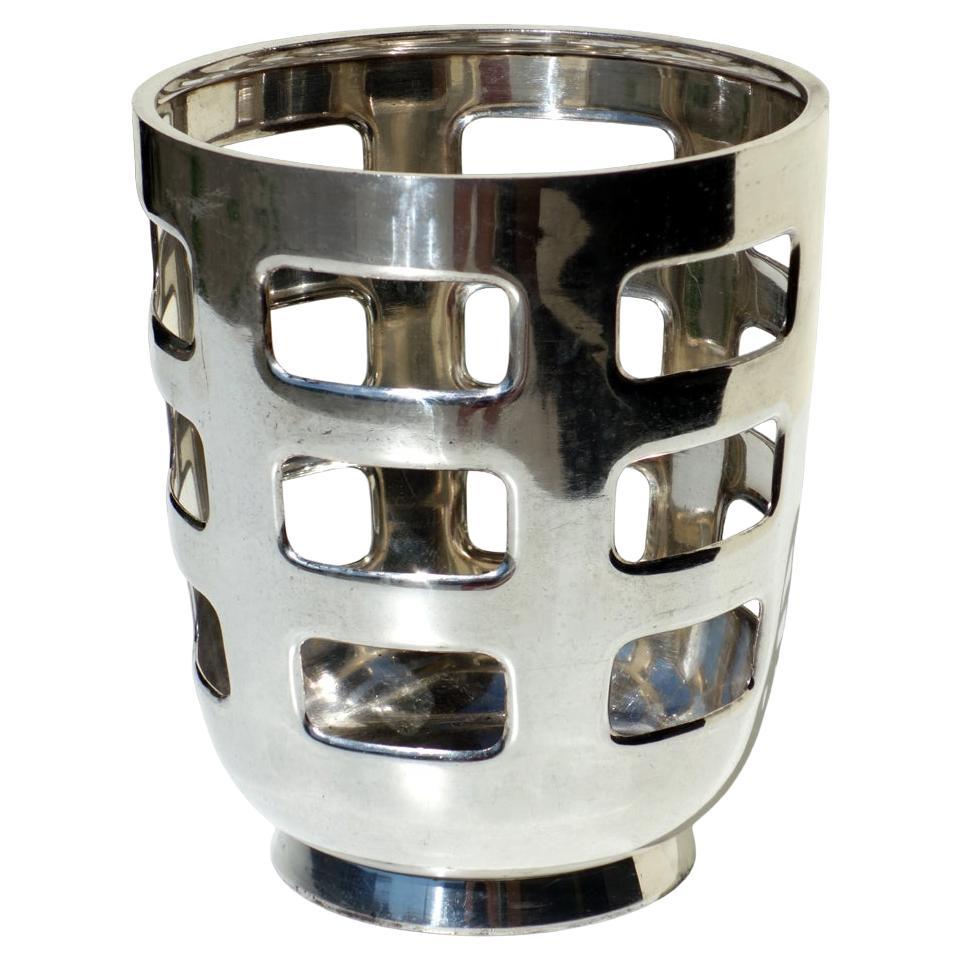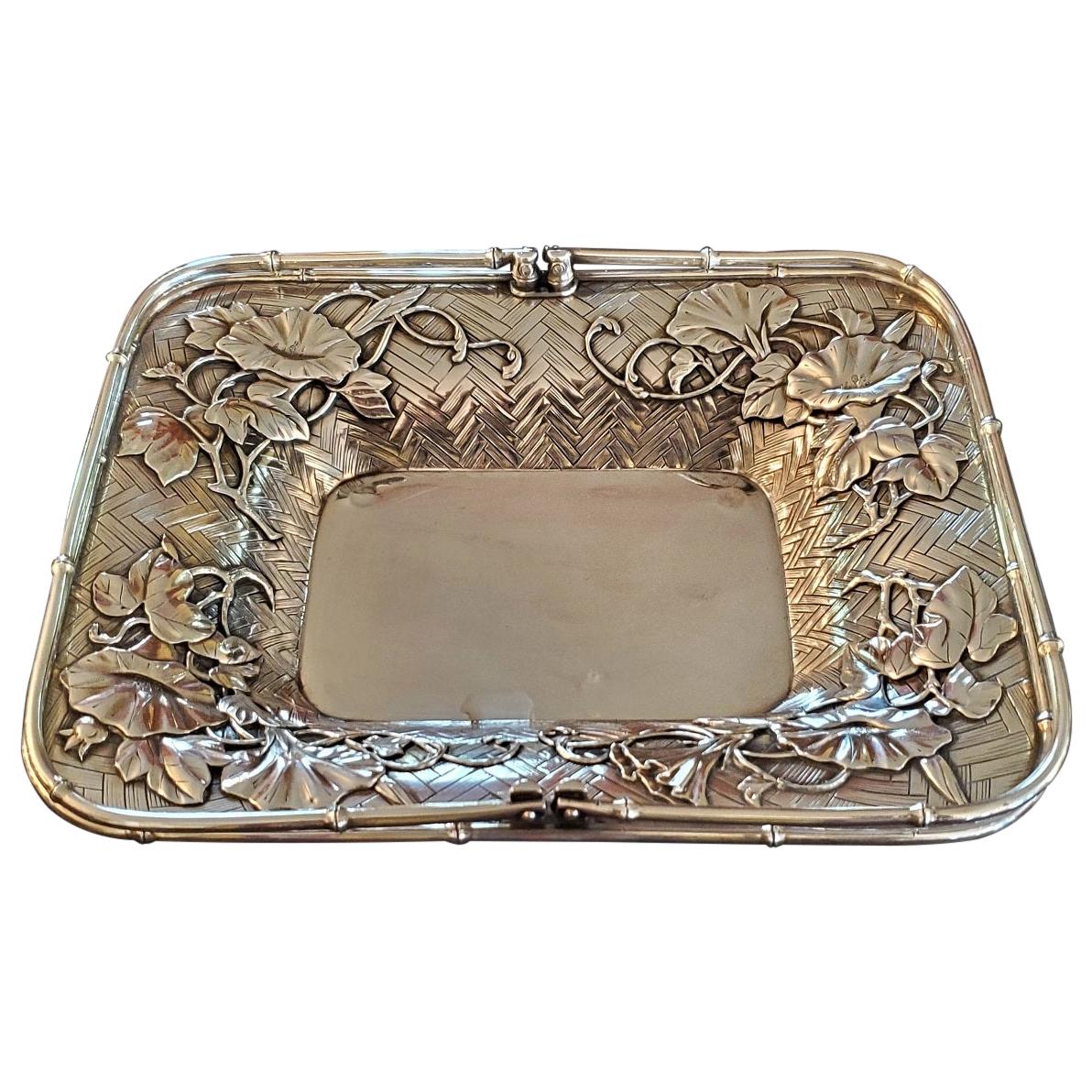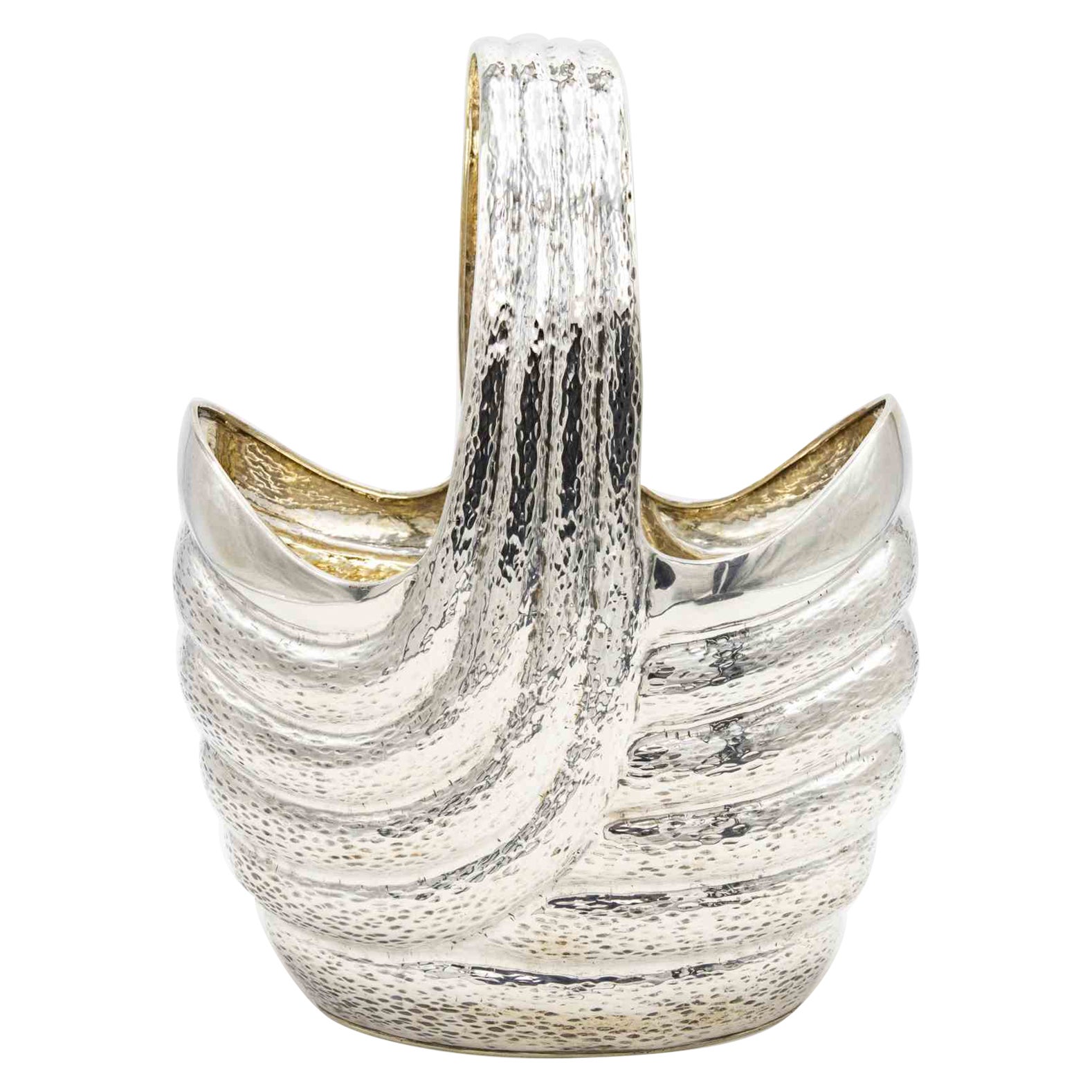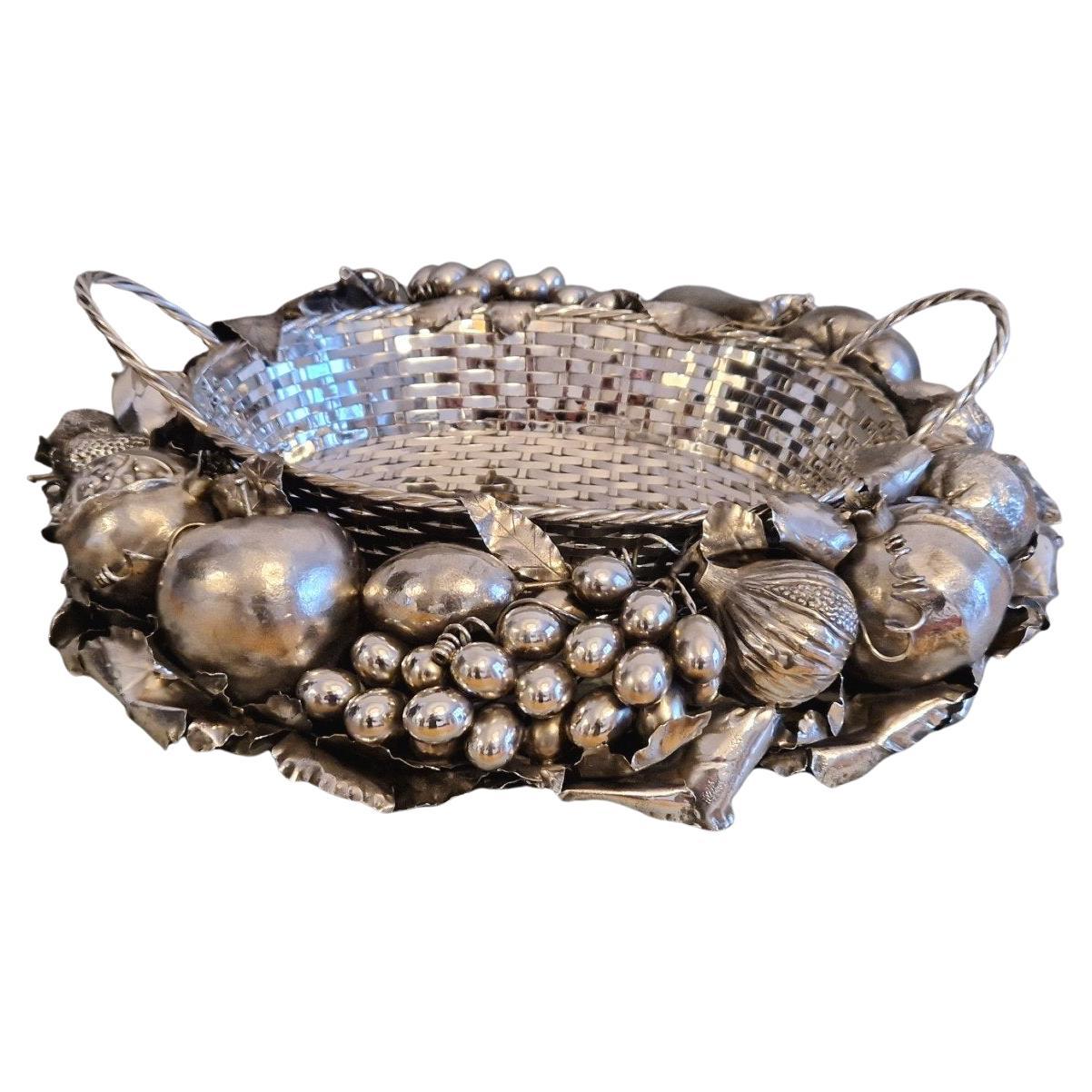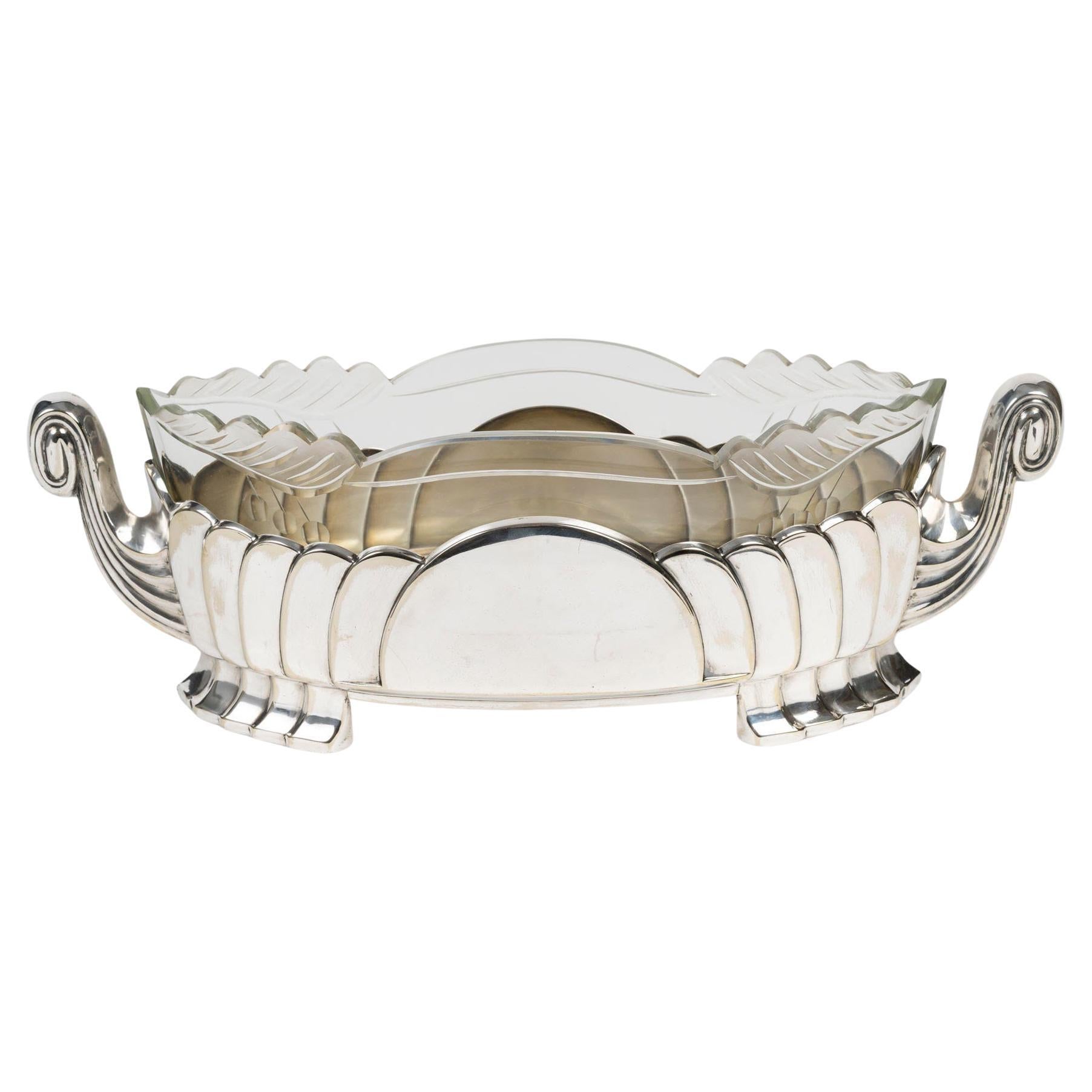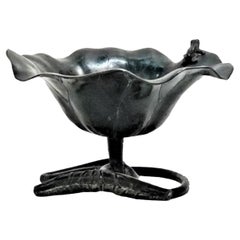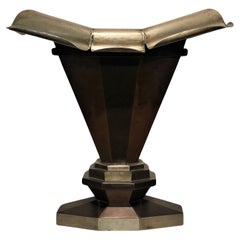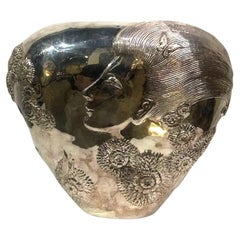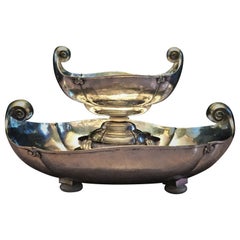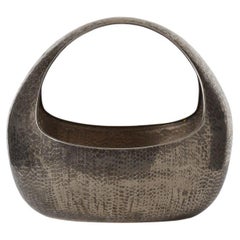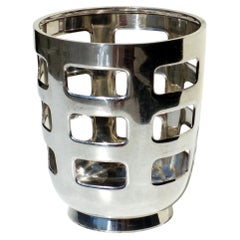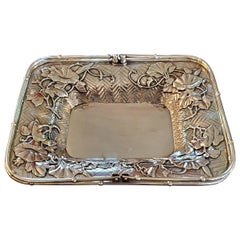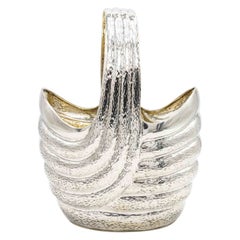Items Similar to Japanese Art Deco Ikebana Chromed Metal Basket, ca. 1930s
Want more images or videos?
Request additional images or videos from the seller
1 of 12
Japanese Art Deco Ikebana Chromed Metal Basket, ca. 1930s
$4,800
£3,645.99
€4,201.42
CA$6,759.59
A$7,494
CHF 3,938.39
MX$91,714.32
NOK 49,186.50
SEK 46,166.46
DKK 31,360.99
About the Item
Art Deco
Ikebana Basket
Chromed Metal
Japan, ca. 1930s
ABOUT
Ikebana is the Japanese art of of beautifully arranging cut stems, leaves, and flowers in vases and other containers that evolved in Japan over seven centuries. To arrange the stems and flowers exactly as one wishes, a familiarity with many different ways of fastening and positioning them is necessary. In ikebana, blossoms, branches, leaves, and stems find new life as materials for art making. In contrast to the western habits of casually placing flowers in a vase, ikebana aims to bring out the inner qualities of flowers and other live materials and express emotion.
The principles of ikebana are:
Silence – It is a time to observe and work with nature.
Minimalism – It is influenced by Buddhism and its ideal of minimalism.
Shape and Line – Ikebana emphasizes shape.
The Buddhist desire to preserve life lies at the root of much of ikebana practice, and has created most of the rules of flower arrangement, controlling also the shapes of the flower vases, formed as to help to prolong the life of the flowers. During the 15th century, society changed drastically, much as it did during the Renaissance period in Europe, and practicing ikebana began formally as a secular endeavor. In the beginning, it was an important activity of the nobility and arrangers were chiefly Buddhist priests and samurai.
While we might consider flowers to be inherently feminine, ikebana was for centuries a predominantly male tradition, although it was practiced by both sexes.
DIMENSIONS
Height: 4.5 inches
Width: 12.5 inches
Depth: 9.75 inches
- Dimensions:Height: 4.5 in (11.43 cm)Width: 12.5 in (31.75 cm)Depth: 9.75 in (24.77 cm)
- Style:Art Deco (Of the Period)
- Materials and Techniques:Metal,Woven
- Place of Origin:
- Period:
- Date of Manufacture:ca. 1930
- Condition:Wear consistent with age and use. Excellent antique condition consistent with age and use. We make our best effort to provide a fair and descriptive condition report. Please examine photos attentively for they are an important part of the description. Send us a message to request m.
- Seller Location:New York, NY
- Reference Number:1stDibs: LU2819337754032
About the Seller
5.0
Gold Seller
Premium sellers maintaining a 4.3+ rating and 24-hour response times
Established in 1993
1stDibs seller since 2017
85 sales on 1stDibs
Typical response time: 8 hours
- ShippingRetrieving quote...Shipping from: New York, NY
- Return Policy
Authenticity Guarantee
In the unlikely event there’s an issue with an item’s authenticity, contact us within 1 year for a full refund. DetailsMoney-Back Guarantee
If your item is not as described, is damaged in transit, or does not arrive, contact us within 7 days for a full refund. Details24-Hour Cancellation
You have a 24-hour grace period in which to reconsider your purchase, with no questions asked.Vetted Professional Sellers
Our world-class sellers must adhere to strict standards for service and quality, maintaining the integrity of our listings.Price-Match Guarantee
If you find that a seller listed the same item for a lower price elsewhere, we’ll match it.Trusted Global Delivery
Our best-in-class carrier network provides specialized shipping options worldwide, including custom delivery.More From This Seller
View AllJapanese Meiji Era Bronze Lotus Leaf Bowl, Vide Poche, ca. 1900
Located in New York, NY
DIMENSIONS: Height: 4 inches Width: 6 inches Depth: 6 inches
ABOUT THE OBJECT
With the laconic Japanese-style Art Nouveau design, filled with symbolism and metaphorism, this multi-use bowl...
Category
Antique Early 1900s Japanese Art Nouveau Vases
Materials
Bronze
American Art Deco Anodized & Painted Metal Planter, ca. 1920s
Located in New York, NY
American Art Deco
Planter with Geometrical Design
Anodized & Painted Metal
ca. 1920s
DIMENSIONS
Height: 13.5 inches
Width: 14.5 inches
Depth: 8.25 inches
Category
Vintage 1920s American Art Deco Planters, Cachepots and Jardinières
Materials
Metal
Erte, "She Loves Me", Silvered Bronze Vase, 1987
Located in New York, NY
ERTE
a/k/a/ Romain de Tirtoff
“She Loves Me"
Vase
Silvered Bronze Vase
1987
DIMENSIONS
Height: 9.5 inches
Width: 12.5 inches
De...
Category
Vintage 1980s French Art Deco Vases
Materials
Bronze
Alessandro Calderoni, Italian Novecento Double-Tier Silver Centerpiece, ca. 1940
Located in New York, NY
Hallmarks: S.A. Calderoni, Milano, 800.
Weight: 160.14 troy ounces (5 kg 794 g), including non-silver material.
DIMENSIONS:
Overall height: 12inches
Bottom vessel dimensions:
Length: 21 inches
Depth: 18.5 inches
Height: 7.5 inches
Top vessel dimensions:
Length: 12 inches
Depth: 9.5 inches
Height: 9.7 inches
This magnificent formal centerpiece was created around 1940 in Milan, Italy by S.A. Calderoni, a famous Italian firm of fine jewelers and silversmiths that was established in 1898 and achieved its greatest fame during Italian Art Nouveau and Novecento periods. The company also manufactured items by special private orders and commissions, and was a supplier to the court of the last Italian King, Victor Emmanuel III.
The outstanding artistic design in the style of Novecento and its generous proportions combined with a remarkable handmade rendering make this magnificent centerpiece not simply a functional object but a true masterpiece of applied arts.
This luxurious hand-hammered silver centerpiece consists of two parts:
- The smaller footed bowl...
Category
Vintage 1940s Italian Art Deco Centerpieces
Materials
Silver
French Art Deco Art Glass and Wrought Iron Flower Vase, circa 1920s
By Charles Schneider
Located in New York, NY
Although unsigned, this Art Deco masterpiece in red and white art glass and wrought iron most probably by Charles Schneider.
Charles and Ernest Schneider were a generation younger...
Category
Vintage 1920s French Art Deco Vases
Materials
Wrought Iron
Vintage Russian Soviet Classic Large Crystal and Silver Circular Bowl, ca. 1945
Located in New York, NY
A Russian Classic, silver and hand-cut crystal circular serving bowl of unusually large dimensions, manufactured in Moscow, circa 1945. Silver rim features repeating oak leaf design,...
Category
Vintage 1940s Russian Empire Serving Bowls
Materials
Crystal, Silver
You May Also Like
Silver-plated basket - Italy, 20th century
Located in London, GB
Sturdy, simple, and stripped of excess. This twentieth-century silver-plated basket reinterprets the traditions of Georgian and Victorian silverware. Historically, such baskets would...
Category
20th Century Italian Decorative Baskets
Materials
Silver Plate
1930 Gio Ponti Calderoni Art Deco Silver Metal Design Fruit Basket Bucket
By Calderoni, Gio Ponti
Located in Brescia, IT
Fruit Bucket
F.lli Calderoni, Milan
Italy, 1930
Rare item
Mark impressed under the base
Excellent Condiction
Category
Vintage 1930s Italian Art Deco Tableware
Materials
Metal
Japanese Meiji Period Sterling Silver 2 Handled Basket by Katsu Miyamoto
By Miyamoto Shoko 1
Located in Dallas, TX
PRESENTING a GORGEOUS, VERY HIGH QUALITY and EXTREMELY RARE piece of Japanese Meiji Period Sterling Silver 2 Handled Basket by Katsu Miyamoto.
EXQUISITE, EXCEPTIONAL, RARE & IMPORTANT!
This is definitely a Meiji Period piece due to the fact that it is marked with the sterling silver mark “jungin”.
The Meiji period was from 1868 to 1912 and in 1928 a law was introduced in Japan compelling the use of decimal marks for silver.
This pre-dates that decimalization law.
We are of the opinion that it is from circa 1900.
Miyamoto Shoko was founded in 1880 as the first silverware specialty shop. In 1899, Miyamoto Shoko’s silverwares were ordered by the family members of the Emperor of Japan, and to this day, they are making fine and graceful handicrafts with skillful craftsmen.
Loved by numerous customers since the Meiji era, Miyamoto Shoko’s products have also been given to Princess Mako and Princess Kako of Akishino, as well as Princess Aiko Toshinomiya, on their birthdays.
Katsu Miyamoto (宮本勝), in 1880, in order to increase the sales of tobacco and cigarettes to foreigners founded the Moyamoto Shoko company, which produced different silverwares in general and particularly silver cigarette cases. Miyamoto’s first name, Katsu (勝) in some sources is written as “Masaru”, since 勝 kanji can be pronounced in both ways.
This basket is of the HIGHEST QUALITY imaginable!
The top of the basket has the MOST GORGEOUS repousse work of flowers, probably lotus flowers, with leaves and foliage. It has an underlying chevron effect chasing, reflecting parquetry.
The 2 handles are cast in the form of bamboo handles.
The rim of the top likewise is cast as bamboo.
The base is equally stunning in a different way!
It is chased with a chevron effect, like parquetry flooring and the four feet simulate pieces of sliced bamboo with an interlinking gallery of support columns, likewise, simulating bamboo.
The QUALITY of WORKMANSHIP is OUTSTANDING!
The pieces weighs exactly 525 grams.
This piece takes my breath away!
This is one for the SERIOUS COLLECTOR of EXQUISITE AND RARE Japanese silver. You will not find another like it, for sale ANYWHERE ELSE IN THE WORLD …… I know as I have searched!
Provenance: Acquired from a Dallas Private Collector.
Dimensions: 9.6 inches wide, 7.6 inches deep and 2.75 inches tall ( 7.25 inches tall with handles up)
Condition: Very good. It looks like the base 4 legged gallery, has been repaired/re-attached to the base, but otherwise it is excellent and of Museum quality.
The Meiji period (明治時代 Meiji-jidai?), also known as the Meiji era, is a Japanese era which extended from October 23, 1868 through July 30, 1912.[1] This period represents the first half of the Empire of Japan during which Japanese society moved from being an isolated feudal society to its modern form. Fundamental changes affected its social structure, internal politics, economy, military, and foreign relations. The period corresponded with the reign of Emperor Meiji after 1868, and lasted until his death in 1912. It was succeeded by the Taishō period upon the accession of Emperor Taishō to the throne.
Solid silver pieces...
Category
Early 20th Century Japanese Meiji Metalwork
Materials
Sterling Silver
Silver Fruit Basket, Italy, 1970s
Located in Roma, IT
Silver Fruit Basket realized by Italian manufacture in 1970s.
Silver 800, hallmark on one of the edges.
Weight: 1,5 Kg
Excellent condition.
Category
Vintage 1970s German Tableware
Materials
Silver
Buccellati Sterling Silver Naturalistic Centerpiece Basket
By Buccellati
Located in Saint-Ouen, FR
Sterling silver centerpiece from Maison Buccellati Made up of a woven basket with two handles, surrounded by natural fruits: strawberries, apples, pomegranates, bunches of grapes, pe...
Category
Vintage 1970s Italian Centerpieces
Materials
Sterling Silver
Art Deco Silver Plated Metal and Crystal Bowl, 1930.
Located in Saint-Ouen, FR
Art Deco silver plated metal and crystal bowl, 1930.
Art Deco period silver-plated metal and crystal bowl, 1930.
H: 13.5cm, W: 41cm, D: 14cm
Category
20th Century French Art Deco Decorative Bowls
Materials
Crystal, Silver Plate
More Ways To Browse
Japanese Metal
Japanese Art Deco
Art Deco Metal Vase
1930s Japan
1930s Japanese
Japanese Metal Flower
Japanese Containers
Vintage Metal Container
Vintage Metal Containers
Japanese Black Metal Vases
Art Deco 1930s Flower Vase
Vintage Flower Containers
Art Deco Japanese Vase
Chrome Art Deco Vase
Japanese Root
Black Ikebana Vase
Priest Japanese
Samurai Vase
